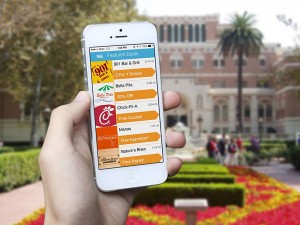OffPeak aims to be resource for on-campus food
It is only Fitz Tepper’s junior year as a business administration major at USC, but his restaurant deal-scoring app, OffPeak, has already reached thrifty food lovers across the country. An idea conceived in its earliest form back in 2010, OffPeak came to be one of the first apps made for The Haverford School, Tepper’s high school in his hometown of Philadelphia. In collaboration with friend and OffPeak co-founder Max Whitehead, Tepper sought to bring convenience to his high school’s dining experience, an idea that has risen to popularity on the USC campus and is now preparing to go national.

Long time coming · Tepper has been working on incarnations of OffPeak since high school. When he came to USC, he adapted and expanded the technology to fit a larger, more complex campus food scene. – Photo courtesy of OffPeak
OffPeak went through many stages of growth before becoming the app that many USC students use today. Tepper and Whitehead initially intended for the project to offer a small-scale convenience to students at The Haverford School by making the daily lunch menu smartphone-accessible, a project which was continued at USC during Tepper’s freshman year in the form of the app Eat at USC. Dining hall menus were made available to students on campus so they could know what to expect prior to waiting in a lunch or dinner line.
It did not take Tepper’s simple-but-useful idea long to spread off campus. Eat at Penn provided the same features to students at the University of Pennsylvania, and it was then that Tepper saw how big of a role food plays in the lives of college students.
From this came OffPeak, a service that allows students to receive dining discounts at local eateries during certain hours of each day. Typically, these discounts are available for use at a restaurant’s off-peak hours, hence the app’s name. For most restaurants, this will often be during the morning hours or after 7 in the evening. For USC students, a popular offer is the buy one sub, get one half off deal at Subway.
At USC, OffPeak has garnered a following with both students and businesses for a few key reasons.
“First, students love us for some pretty obvious reasons — there is literally no other platform where you could walk into a franchise as large as Subway right now and get a buy one get one free sub … end of story,” Tepper said.
But in spite of the positive feedback OffPeak might receive from students, there is another group that might even appreciate the app more: restaurants.
“Restaurants love us because we aren’t a deal company. We only make money if they do. With Groupon, 44 percent of restaurants lose money, and most do not choose to use it a second time,” Tepper said.
OffPeak is able to support local restaurants because the app only profits when a restaurant does. There is no fee for being included on the app, so if OffPeak doesn’t bring business to a certain restaurant, it doesn’t have to worry about losing money. This satisfaction from restaurants keeps the app up and running, and the app, in turn, goes on to support the restaurants it lists.
As of now, OffPeak is working on adding new featured restaurants every week. Some of the currently offered restaurants most popular with students include Subway, 901 Bar & Grill and Bella Pita. Tepper also revealed that an Indian restaurant will be added soon.
On top of the addition of more businesses, OffPeak recently also took on a more socially interactive feature. The app has adopted a sort of newsfeed comparable to that of Venmo’s, so users can now see what deals their friends are cashing in on. To make thrifty eating even more fun, OffPeak holds a monthly contest in which the top three users win a cash prize.
After proving its success here at University Park, the app is now preparing to make big entrances on campuses across the country. As both Tepper and Whitehead were raised in Philadelphia, the next OffPeak campus will be the University of Pennsylvania.
In their expansion goals, the two students are tapping into their high school network, which is comprised of students who attend universities across the country. As of now, the next colleges OffPeak will reach after Penn are UCLA and Georgetown University.
Tepper cites both his family and his classes at the Marshall School of Business for preparing him to take on this project. His family in Philadelphia owned a restaurant and had always been involved in the hospitality industry.
“There was really no question with what I was going to do in college. I knew I would go on to study business,” Tepper said.
From a young age, Tepper had always been interested in technology and cites that interest as a reason for coming to the West Coast for college. In terms of his Marshall classes, he attributed his professional selling class for giving him hands-on training to pursue a project like OffPeak on the side.

